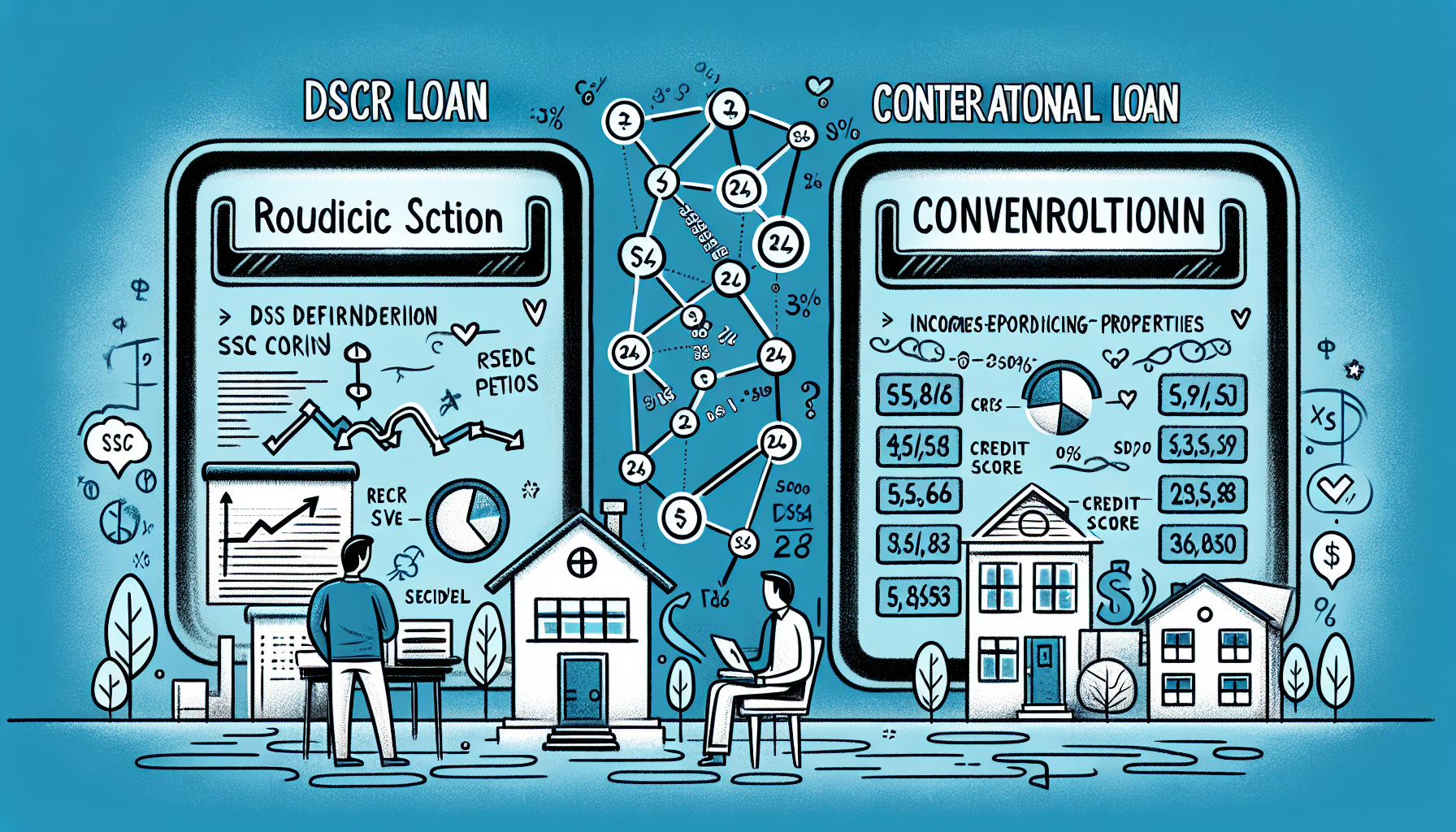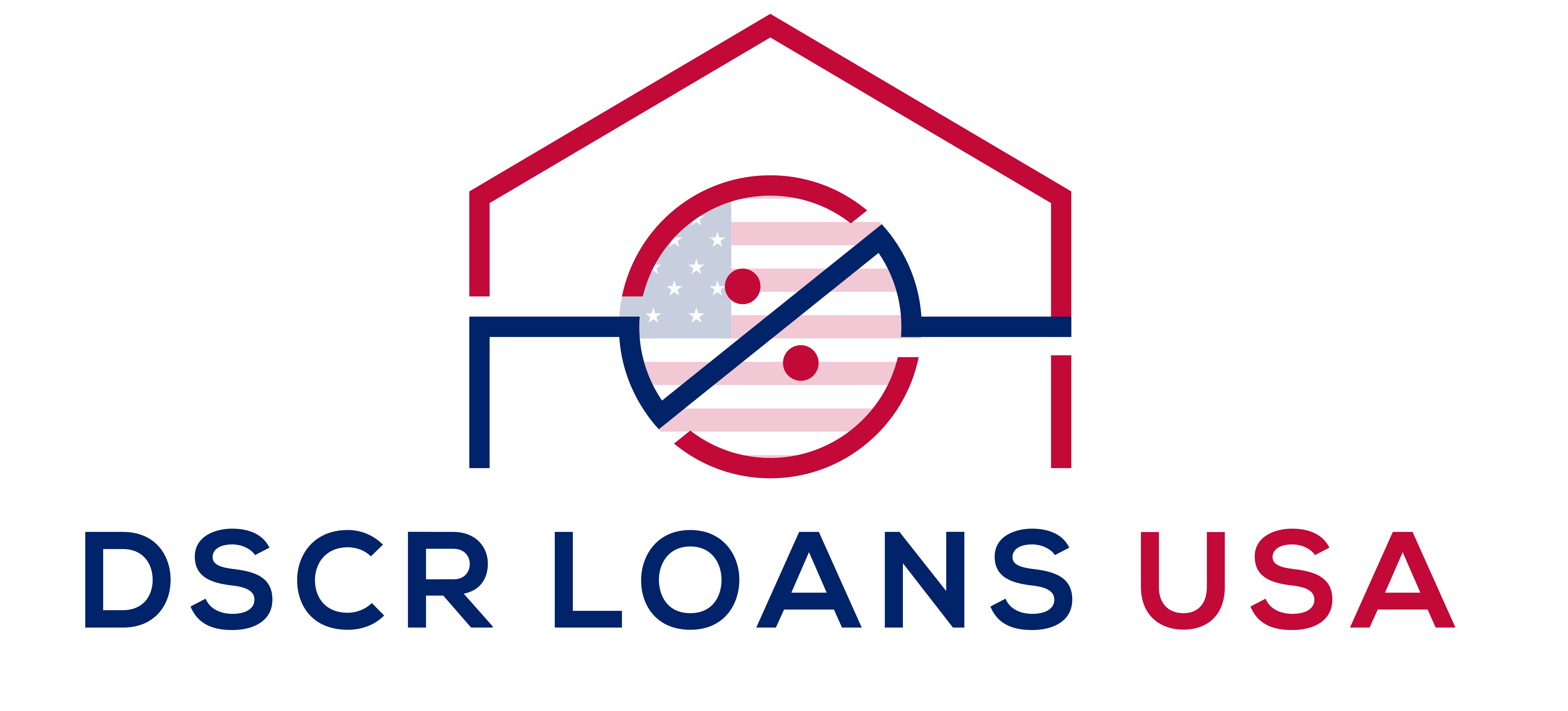DSCR Loan vs Conventional Loans
When exploring financing for real estate, investors and homebuyers often weigh the benefits of a DSCR loan against those of a conventional loan. The main question you’re likely asking is: Which loan type is better suited for my property investment or home purchase?
A DSCR loan focuses on the income your property generates, which is ideal for investors in rental properties who might not meet the personal income documentation standards required by conventional loans.
On the other hand, a conventional loan is more aligned with borrowers who have stable personal incomes and good credit scores. This article dives into the complexities of dscr loan vs conventional loan to guide you through making the right choice for your financial situation.
Key Takeaways
- DSCR loans cater to real estate investors, focusing on property cash flows rather than the borrower’s personal income, and are well-suited for non-owner occupied rental properties that generate sufficient income to cover the mortgage debt.
- Conventional loans are standardized mortgages that follow Fannie Mae and Freddie Mac guidelines, often preferred by borrowers with stable income and good credit, and come with a variety of terms and down payment options.
- The choice between a DSCR loan and a conventional loan depends on personal financial situations and investment goals. DSCR loans are ideal for investors with strong rental income, less traditional income documentation, and those looking to finance multiple properties.
Understanding DSCR Loans

DSCR loans provide a promising option for real estate investors and self-employed individuals, focusing on property cash flow over personal income. These loans offer financing for non-owner occupied properties, emphasizing the income generated by the property. Imagine a scale where on one side you have the property’s annual net operating income and on the other, its total debt service. The DSCR loan tilts in favor of those whose scale tips towards a healthy debt service coverage ratio, as this ratio—a crucial measure of financial health—assesses the property’s ability to cover its mortgage debt.
DSCR loans are attractive due to their distinct features: they accommodate rental income properties without the need for personal income verification and permit financing for multiple properties, making them a flexible option for real estate investors.
The Importance of Cash Flow
Cash flow is the critical factor influencing eligibility for DSCR loans. It’s the compass that guides lenders as they navigate through the seas of financial stability and risk assessment. The calculation is straightforward yet vital: the property’s annual income minus operating expenses gives us the net operating income, a key determinant of current cash flow. Lenders then take this figure and divide it by the total debt service to find the DSCR, which ultimately dictates the maximum loan amount.
A property that can comfortably handle its mortgage payments with income to spare is like a ship in calm waters, deemed financially stable and attractive for investment. It’s this consistent income generated that lenders prize, as a higher DSCR ratio signals a property’s proficiency in fulfilling its debt obligations, painting a picture of financial success.
DSCR Loan Requirements
Entering the realm of DSCR loans necessitates a clear understanding of the loan approval process. Here are the key steps:
- Credit score: A credit score of 620 or above is required to proceed.
- Property value: The value of the property is assessed to determine the loan amount and borrower’s eligibility.
- Return on investment: Lenders evaluate the potential of the property to yield a return on investment.
These steps are crucial in determining the approval of a DSCR loan.
This streamlined loan application process, untethered from the constraints of personal income verification, positions DSCR loans as a strategic choice for the financially astute real estate investor.
Understanding Conventional Loans

Conventional loans, a mainstay in the mortgage world, adhere to the stringent guidelines established by Fannie Mae and Freddie Mac. These conventional mortgages are the standard bearers for borrowers with stable income and good credit, offering a safe harbor in the form of residential mortgages that are not insured or guaranteed by the federal government. Whether conforming to the standards of government-sponsored entities or venturing into the non-conforming space, conventional loans serve as a versatile financing option for a broad range of property types. They are particularly well-suited to individuals with traditional employment seeking to anchor themselves in a home of their own.
With the promise of lower interest rates for those with excellent credit and a wider spectrum of property types, conventional loans are the go-to choice for many looking to finance their primary residence or second home. However, it’s worth noting that this pathway to property ownership is paved with requirements such as a good credit score, a manageable Debt-to-Income (DTI) ratio, and potentially a larger down payment.
Qualifying for a Conventional Loan
To secure a conventional loan, an applicant must begin with a credit score of 620 or higher and provide evidence of stable income. While the standard down payment for these loans typically stands at 5%, there are harbors where one can dock with as little as 3%, thanks to specialized programs designed to lower the barrier to homeownership.
This flexibility in the down payment echoes the adaptability of conventional loans, making them accessible to a broader audience and providing a stable financial foundation for purchasing a home.
Conventional Loan Options
Choosing between conventional loan options is like deciding between a stable sailboat and a speedboat capable of handling market volatility. Fixed-rate mortgages promise the tranquility of unchanging interest rates and monthly payments, ensuring financial predictability throughout the life of the loan. These fixed-rate loans, often available in 15-year and 30-year terms, provide a secure and unwavering financial journey.
On the other hand, adjustable-rate mortgages offer initial calm seas with lower interest rates fixed for a set period, after which they adjust according to the currents of the market. Varieties like 5/1 ARMs, where the rate is fixed for the first five years, cater to those willing to navigate the potential ups and downs of interest rates in pursuit of initial savings.
Comparing DSCR Loans and Conventional Loans
When comparing DSCR loans with conventional loans, it’s important to consider the unique criteria each loan type evaluates. DSCR loans, which focus on the property’s income, differ from conventional loans that scrutinize personal finances, including income, cash flow, and credit score. This divergence is not without its trade-offs, as DSCR loans typically come with a higher down payment, steeper interest rates, and additional fees compared to their conventional counterparts.
The fork in the road between opting for a DSCR loan or a conventional loan hinges on an individual’s financial situation and the properties in question. Real estate investors who thrive on strong rental income but may fall short on traditional income documentation often find DSCR loans align with their needs.
Interest Rates and Loan Terms
DSCR loans often sail into headwinds with higher interest rates, a reflection of the higher risk perceived by lenders due to the focus on property income over the borrower’s personal income. In contrast, borrowers with strong credit profiles can find safe harbor with conventional loans that offer more competitive interest rates. The financial journey with DSCR loans must account for the impact of these higher rates, which can significantly shape the overall cost over the loan’s lifetime. When comparing dscr loan vs conventional, it’s important to consider these factors.
Choosing a mortgage is a game of financial trade-offs, where borrowers must decide whether to weather the upfront costs of lowering the interest rate by paying points or to navigate with lower immediate costs despite a higher interest rate in the long run.
Property Types and Investment Strategies

Property types and investment strategies are the compass and map guiding real estate investors in their choice between DSCR and conventional loans. While conventional loans offer the versatility to finance a wide gamut of properties, including investment properties, DSCR loans set their sights on rental properties that showcase strong income potential in the realm of real estate investing.
These properties, with their ability to generate significant property’s cash flow, are especially well-suited for DSCR loans, as the loan eligibility rests on the property’s ability to sustain itself financially.
Tailoring Your Loan Choice to Your Financial Goals

Selecting the right loan type must be a tailor-made decision, intricately sewn to fit personal financial goals and investment plans. For investors who prioritize the art of leverage and maximizing their debt-to-income ratio, DSCR loans can be the fabric that best suits their financial silhouette. The tapestry of loan options requires a careful assessment of the overall cost, risks, and total financial impact to ensure that the chosen loan is a seamless fit with one’s financial objectives.
Thus, aligning the loan choice with investment goals is not just a strategic move—it is crucial for ensuring a prosperous financial future.
Tips for Improving Your Loan Eligibility
Improving loan eligibility is like navigating through financial waters, necessitating preparation and understanding of the journey ahead. Financial preparation is the cornerstone of this journey, which includes understanding one’s credit history and having a clear vision of the desired loan type. This foresight is particularly beneficial for those seeking either DSCR or conventional loans, as it lays the groundwork for a successful passage through the loan application process.
Boosting Your Credit Score
To improve one’s credit score, a few strategies can be particularly beneficial. Here are some strategies to consider:
- Manage credit utilization by paying down balances and requesting higher credit limits.
- Establish a diverse credit history by using secured credit cards and becoming an authorized user on existing accounts.
- Make all payments on time and address any collections judiciously.
By following these strategies, you can enhance your credit score and increase your chances of getting approved for loans and other financial opportunities.
Moreover, scrutinizing credit reports for inaccuracies and disputing any errors found is as crucial as navigating with an accurate map, as it ensures one’s credit score accurately reflects their financial conduct.
Managing Debt and Cash Flow
Managing debt and cash flow is as critical for a loan applicant as it is for a ship’s captain. DSCR loans, in particular, often require borrowers to have cash reserves on hand, prepared for unexpected expenses or vacancies akin to unexpected storms. Refinancing, while it may offer temporary relief, should not be relied upon as the sole strategy for debt management, as it is subject to economic tides and the ebb and flow of interest rates.
A careful balance of existing debts, a stable borrower’s personal income, and a keen awareness of one’s financial situation are the navigational tools needed to maintain a steady course towards loan eligibility.
Working with Mortgage Professionals

On the journey towards homeownership, mortgage professionals act as experienced guides, linking borrowers with appropriate lenders and negotiating competitive rates to simplify the homebuying process. These intermediaries, known as mortgage brokers, work tirelessly on behalf of borrowers to scout the mortgage landscape for terms that align with the borrower’s unique financial circumstances.
The tailored assessment and advice they offer are akin to a lighthouse guiding ships to shore, ensuring that borrowers are steered towards the best financing options available for their situation.
Finding the Right Mortgage Broker
Searching for a reputable mortgage broker requires due diligence, similar to the process of finding a reliable crew for a sea journey. Research, referrals from trusted real estate agents, and consultations with the annals of online reviews are instrumental in uncovering a broker’s professional licensing and reputation.
Comparing mortgage products, understanding the fee structures, and evaluating the broker’s track record with borrowers of similar financial profiles are key steps in selecting the right mortgage broker. Access to a broad spectrum of lenders, including those beyond the public’s reach, can significantly enhance the borrower’s chances of finding loan options tailored to their needs.
Navigating the Loan Application Process
During the loan application process, mortgage brokers:
- Guide the process, ensuring documentation is organized and communication between borrower and lender remains clear
- Collect financial information
- Champion the borrower’s case to lenders
- Maintain a steady dialogue until the loan is secured
Their role extends beyond mere facilitation. Utilizing the services of a mortgage broker can help streamline the loan application process and increase the chances of securing a loan.
A crucial step in this process is obtaining pre-approval, which fortifies the buyer’s position in the housing market, much like a flag hoisted high signifies strength and readiness. Knowing which type of loan one desires before obtaining Loan Estimates allows for consistent and informative comparisons across various lenders.
Companies like The Mortgage Shop, LLC exemplify the goal of mortgage professionals: to make the loan application process as straightforward and stress-free as possible, ensuring a smooth journey from start to finish.
Summary
As we draw the map of our financial journey to a close, it’s clear that the choice between a DSCR loan and a conventional loan is not one to be taken lightly. Each path offers unique landscapes, and the right choice depends on your individual financial goals and the nature of your real estate endeavors. Remember, the key to making the smart choice is understanding the terrain, aligning with your financial compass, and seeking guidance from seasoned professionals. May this guide serve as your beacon, illuminating the path to financial triumph in the world of real estate investment.
Frequently Asked Questions
What exactly is a DSCR loan?
A DSCR loan is a type of non-owner occupied financing that considers the cash flow generated by a property instead of the borrower’s personal income. This type of loan is suitable for rental income properties and does not require personal income verification, making it advantageous for real estate investors and self-employed individuals.
Can I get a conventional loan with a low down payment?
Yes, you can get a conventional loan with a low down payment, as some programs allow for down payments as low as 3%, making it easier for borrowers to access conventional financing options for home purchases.
How do DSCR loans differ from conventional loans in terms of interest rates?
DSCR loans typically have higher interest rates than conventional loans because they are approved based on property income, which presents higher risk to lenders.
What are some strategies for boosting my credit score?
To boost your credit score, improve credit utilization by paying down balances and possibly increasing your credit limits. Additionally, establishing a diversified credit history, maintaining on-time payments, and regularly reviewing credit reports for inaccuracies can help.
How can a mortgage broker help me in the loan application process?
A mortgage broker can help in the loan application process by assisting with paperwork, communicating with lenders, and helping you obtain pre-approval, ensuring you are guided towards the best financing options. This can streamline the process and increase the likelihood of securing a loan.
Ready for More Great Tips and Information? Join Our Email List Today!


Leave a Reply